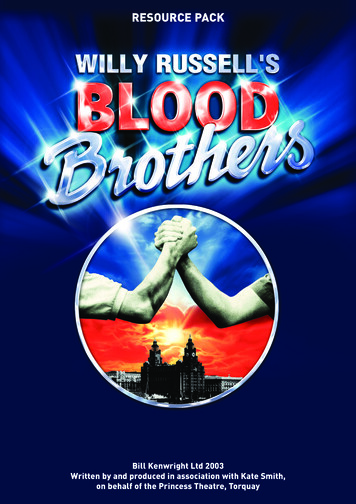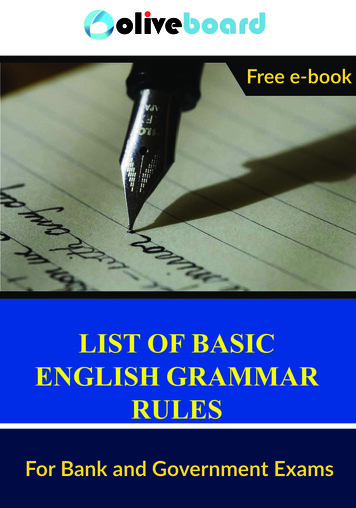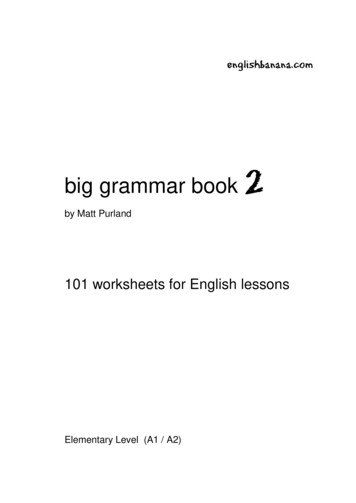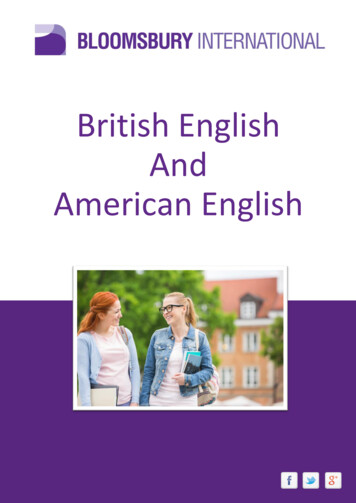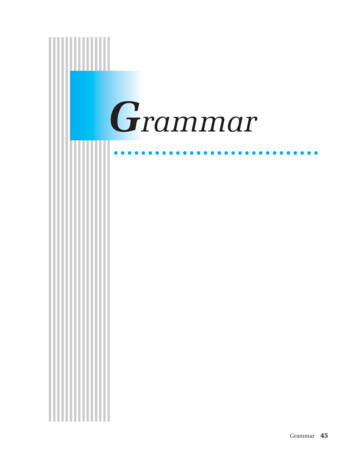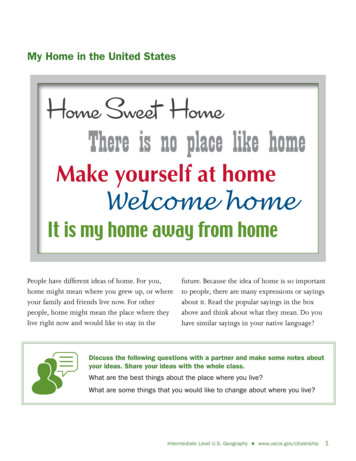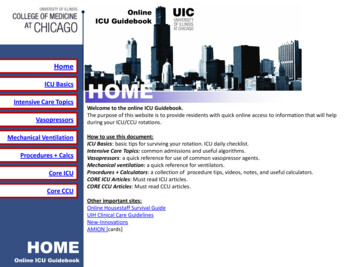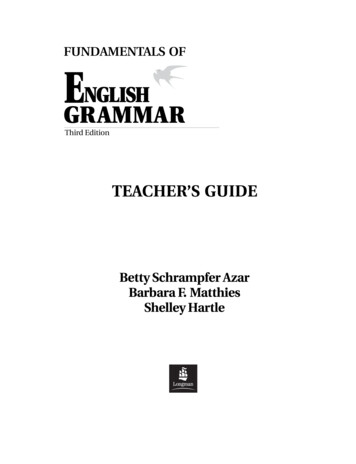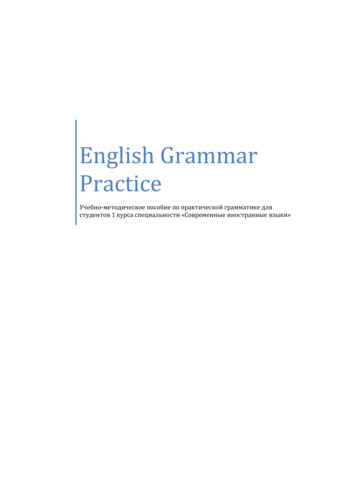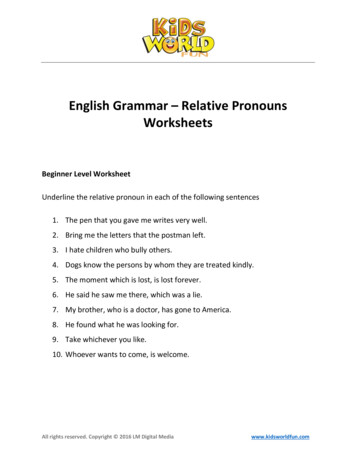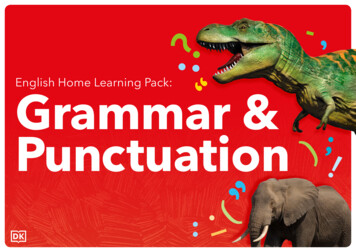
Transcription
:?“Grammar &Punctuation.(:–”English Home Learning Pack:-,;)!
Parts of speech quizHere is a passage from a story for you to read.Then, see if you can answer the questions below.You’ll find the answers on the next page.It was getting dark, and the animals inthe jungle were slowly beginning tostir. The tiger opened one eye, thenstretched and yawned lazily. He wasfeeling hungry, because he hadn’teaten for two days. He looked up at themoonlit sky above. The Moon wassmall and pale, so there wasn’t muchlight. Yes! It would be a perfect nightfor hunting!Can you find 11 more verbs inthe story? (Don’t forget to includedifferent forms of the verb be.)adjectivesdark hungryCan you find the pronoun thatreplaces the word tiger?Can you find four moreadjectives in the story?Have a go at this quiz, all about verbs, nouns, and more!Answers are at the bottom of the page. Did you get them right?1. Can you find one moreadverb of manner?2. Can you find one adverbof place, and one adverbof time?conjunctionsandprepositionsin1. Is and a coordinating conjunctionor a subordinating conjunction?2. C an you find two subordinatingconjunctions?Can you find twomore prepositions?interjectionsdeterminersa the muchCan you find oneinterjection?Can you find two numbers that aredeterminers?verbsstretched would bepronounsit1. What tense is was gettingand were beginning?2. C an you find four verbs inthe past tense, and one verbin the past perfect?AnswersHow many morenouns can you find?adverbsslowly onlynouns seven: animals, jungle, eye, days, sky, night, light verbs get, begin, stir, open,yawn, feel, eat, look, was, were, wasn’t pronouns he adjectives moonlit, small, pale,perfect tenses 1. past progressive 2. opened, stretched, yawned, looked; hadn’teatenadverbs 1. lazily 2. there; then conjunctions 1. coordinating 2. because, soprepositions for, at determiners one, two interjections Yes!nounstiger Moontenseswas getting openedSuitable for 5–7 yearsContent from: Visual Guide to Grammar and PunctuationAvailable now
n quizPunctuation quizPunctuation quiz. , commas,commasfull stopsAs.weI asked.watched from a safeAs we watched from a safe,.1. How many more full stops full stops1. How manyfulldistance,we.samoremmoc stopscommas distance,spotwes llu.f ,full stops. I asked.Here is a passage fromcan you find?you find?a story for you to read.1. Whatfrome.faIs asked.a1.mWhatocanrf ddoesehctthisaw ecommaw sA separate?As we watched.ddoeseksaathissafeI .comma separate?ddeellllaaccIIddnnaanne iseThen,seeif .Canyoufindacommainalist,2.CanyoufindBHereBa passagefromn1. How many morespots lluwef ero.m ynam woHa.1comma in a list,. ewfull,estopscnatsid distance,d thend theinsteadn anthen commauoyseparate?nac between twohisDete a story ford ayouDeted his?etaracanpesyouammoc siht seod tahW .11. What does this?commae IbbdeesloThen,see if youfo dyoune efindht taa ecommareht si tinahaWlist,.2,t2.siWhatl a ni aismtheremoc aatdthenfi uendoy nofaC .22. Canack to stayedBecnloasn n anedrothbebners back tostayed cquestions.the robbers brow thnedtheofoacfulla fo daebetweentsni ,yrotstwoehtowstory,t neewinsteadteb amma dnaandlluafcommativlleoBwedlloweanswertheear the parkp).artsih dnaeteercfoDnartner focaneseanndeahristhe emmoloththsscquestions.ttttokcab sdaa(a(akeceeythth::assa(b)(b)buuwwbenrsce, we sair hobtaeir hot llowed thae drocolonscolonsbracketsbracketsnce, we sa thsttaisis.d)).kartrkauufoapmmoorpooeht ressefrfrnggr thtaking thinhed all house neearewatchedtaking edtakingthingsoutireahrsn were insid distance, we say, jewellery ancolons st(anolochouse tuo sg as elltheberyeksmallcarb housebrackets (assmallers were insid bag: money, jeweroabetunmooosfrmg:dineghath money,tceyrge, black bwofycktakingbag:s nearthepark) dna yrneiht gnikgs thejewelleryeretheirinthdlaena,their large, bla atches – all theAths ewej ,eearetcohneeexpensive-lookings ookinbgawaandt’y, jewell sped. y“What’swatches and expensive-lookingbers acketsyeekehacstgthnsive-lookin ddenly, Ben epark)gneiht ehir lathee thinall, BuudhdWhat– lyof peredle.rgesenrehere?the colon introduce?here?s’tahW“ .dep t ls colonWhatdoese“Wolen earlier. S ed. “Look,” he herebracketskdesagvspaoasio“Len genokedly., BskkedI re?aeprlps!”miaisheee matter?” I a ndma’s purse!”hWehwrsnwehWhat does the colon introduce?ecudortni noloc eht seod tahWole itad thoka,”’shpeu“Ldomedra. nGradekool eW ”!sGwmaeareedask’t waitlouoldknTh”aI t’ette! r?Woc!”eshere! That’s d smiled; we couldnth’teeeThwrs“;udps ilea’smd rar yphensanddasheswocneeet each other ma’s face when we“Thwaetree!aTchhaod;face wndnsmmilae’srGaradlot ew totopursfaa’sfoWhat’sWhat’s the matter?expensive-lookingexpensive-lookingnd her pursdmucne dwphuersrthe. esrue’de . matter?to see Ghraernwher we’d fourehdWhat’sthematter?rettam eht w1. What does the apostrophe1. Whatdoesa theapostrophe1. Whyis therehyphenhere?1. Why is there a hyphen here?erhettersmes?r?Acapital lettersAAcapital lettersAsAs SuddenlySuddenly commas “b”invertedinvertedcommas“b” nWhy are capital letters used in“What’s“What’sthe matter?”“What’sthe matter?”thesewords?thesewords? the u findfindfourcapitalWhatdo aracters’names?commas show?Whatdoinvertedthe invertedWhatdo thecommasshow?commasshow? !? exclamation marks!question marksmarks!exclamationquestionmarksexclamation marksWhat’s the matter?That’s Grandma’s purse!That’sWhat’sGrandma’sthe matter?purse!That’s Grandma’s purse!Is the question mark inside orWhy is there an stioninside orthe mmas?116extra informationwords together 2. watches – all the things they had stolen earlier; longer 3. to introduce“i” (what is) 2. GrandmaGrandma’s purse, Grandma’s face hyphens and dashes 1. to join the twocolons a list of things brackets because it’s extra information apostrophes 1. the letter1. two clauses 2. money, jewellery and expensive-looking watches; their large, black baghappening full stops 1. four 2. ellipses . It suggests that there is more to say commasquestion marks inside exclamation marks to show that something exciting isDetective Brown inverted commas direct speech – it is exactly what someone saidcapital letters 1. because they are at the beginning of a sentence 2. Ben, Grandma,Answers”b“ sammoc”?rettam eAnswersAnswersAnswersthey are at the beginningcapital letters 1. becausecapitalof a sentenceletters 1.2.becauseBen, Grandma,they are at the beginning of a sentence 2. Ben, Grandma,capital letters1. becauseare atof ainvertedsentence2.saidBen, Grandma,Detective Brown invertedcommasdirecttheyspeechDetective– theit isbeginningexactlyBrownwhatsomeonecommasdirect speech – it is exactly what someone saidDetectiveBrown invertedcommasdirect– it isinsideexactlywhatsaid to show that something exciting isquestion marks insideexclamationmarksto ationis someonemarksquestionmarksinside .exclamationmarksto showthat somethinghappening full stops1. four2. ellipsesIt suggestshappeningthat therefullis morestopsto1.sayfourcommas2.excitingellipsesis . It suggests that there is more to say commashappening full stops 1. four 2. ellipses . It suggests that there is more to say commas1. two clauses 2. money,jewellery and expensive-lookingwatches;large,black bag1. two clauses2.theirmoney,jewelleryand expensive-looking watches; their large, black bag1. two clauses 2. money, jewellery and expensive-looking watches; their large, black bagcolons a list of thingsbracketsbecauseit’s extrainformationcolonslistapostrophesofthings brackets1. thebecauseletter1. theit’sletterextra information apostrophes 1. the lettercolonsa list of thingsbracketsbecauseit’s aextrainformationapostrophes“i” (what is) 2. s“i” (whatfaceandis) 2.dashesGrandma’sGrandma1. todashespurse,join theGrandma’s“i” (whatpurse,is) 2. GrandmaGrandma’spurse,hyphensand1.twoto join thefacetwo hyphens and dashes 1. to join the twowords together 2. watches– all thethings 2. watches3. to longerintroduce– all thethey had stolen earlier; longer 3. to introducewords together2. watches– all thehad stolenearlier;3. thingsto introduceextra information extra informationextra informationd in1. here?tahaWdash.1?e2.reCanhdoesnehyouptheyh findaehere?reahtdashsi yhW.1 1. Whyhyphenreplace– is– anyoufindadash–isCan youfind twoit 2.longeror shorterit longer or shorter2. Can you findowt dnfi uoy naC .2rettworohs ro regnol tiit longer or shorterapostrophes?thanpossessivea hyphen?than a hyphen?possessive apostrophes?hportsopa evissessop?nehpyh a nahtthan ?asehyphen?3. Why is it?there?3. Why is it there?ereht ti si yhW .3 3. Why is it there?replace here?2. Can you find twopossessive apostrophes?Whyis there an exclamationmarkhere?mark here?711Test what you know about punctuation with this cool quiz!Answers are at the bottom of the page. How did you do?Suitable for 5–7 years117Content from: Visual Guide to Grammar and PunctuationAvailable now!117detrevni?wskra!esrup s’anoitamalcx117
Common mistakes in grammarIt’s easy to make mistakes with grammar!Here are a few things to watch out for.Who’s means who is or who has. You usewhose to ask who something belongs to. It’s means it is or it has. Its shows that somethingbelongs to an animal or an object. Look, it’s apolar bear.Look, its apolar bear. This monkey is usingits tail to hold on!This monkey is usingit’s tail to hold on! Look at the ducks. They’reswimming on the lake. Theyuse their feet to paddle.Look at the ducks. Thereswimming on the lake. Theyuse they’re feet to paddle.What are those?Are they lychees? Yesterday wewere at school.Yesterday wewe’re at school. There are someconkers over there.They’re are someconkers over their. We’re on holiday now!Were on holiday now!Whose shoes are these?Who’s shoes are these?This is a fruit saladthat I made.This is a fruit saladwhat I made.You’re means you are. Your things are the things that belong to you. You’re good at drawing.Your good atdrawing.We’re means we are. Were is the past tense of the verb be. You use what to ask questions. You use that in relative clauses.They’re means they are. We use there to refer to a place.Their means belonging to them. Who’s coming toyour party?Whose coming toyour party? Are theseyour pencils?Are theseyou’re pencils?He’s means he is. His things belong to him. He’s my brother.His my brother.Dan is riding his new bike. 121120Watch out for grammar mistakes! Use this page to helpavoid mistakes with your next piece of English class work.Suitable for 5–7 yearsContent from: Visual Guide to Grammar and PunctuationAvailable now
Common mistakes in punctuationIt’s easy to make mistakes with punctuation! Here area few things to watch out for.Use a comma between adjectives,when they come before a noun. Always use a capital letter at the beginning of a sentence, for names(proper nouns) and for the pronoun I. Giraffes live in Africa.giraffes live inafrica. This is a present Ibought for Arjun.This is a presenti bought for arjun.Don’t use a capital letter after a colon or a semi-colon (unless it’sa proper noun or the pronoun I). He showed me what wasin his pencil case: pencils,pens and a rubber.He showed me what wasin his pencil case: Pencils,pens and a rubber.she loves playing in thegarden!Our dog is always muddy;Shehe loves playingin the garden!Use an apostrophe to show possession, andremember to put it in the correct place.Singular 122my brother’s trainersmy brothers’ trainersJohn Our dog is always muddy; my brothers’ trainersmy brother’s trainersJohn“Let’s play on theswings,” Zara said.“Let’s play on theswings”, Zara said. “This is fun!”Charlie shouted.“This is fun”!Charlie shouted. I love those shoes(the red ones).I love those shoes(the red ones.) I’ve always wanted a hamster.(My mum has always refusedto buy me one.)I’ve always wanted ahamster. (My mumhas always refusedto buy me one).BillWatch out for punctuation mistakes! Use this page to helpavoid mistakes with your next piece of English class work. a huge,terrifying dinosaura huge terrifying dinosaurYou can use brackets for adding extra information. The full stop usuallygoes after brackets, but it goes inside the brackets if the information inthe brackets is a full sentence. Plural Always use a capital letter at the beginning of direct speech. Don’t forgetto put a punctuation mark at the end, inside the inverted commas. a beautiful,beautiful colourfulbirda beautiful colourfulbirdSuitable for 5–7 years123Content from: Visual Guide to Grammar and PunctuationAvailable now
Content from: Visual Guide to Grammar and Punctuation Available now Have a go at this quiz, all about verbs, nouns, and more! Answers are at the bottom of the page. Did you get them right? Suitable for 5–7 years. capit
